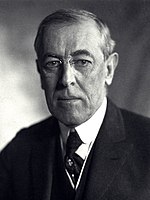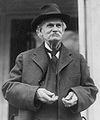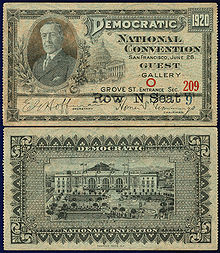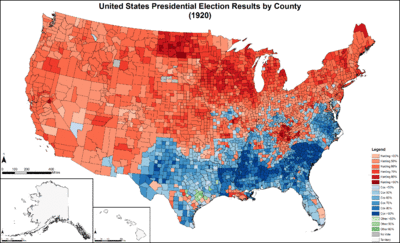1920 United States presidential election
Woodrow Wilson Democratic Warren G. Harding Republican Presidential elections were held in the United States on November 2, 1920.
Incumbent Democratic president Woodrow Wilson privately hoped for a third term, despite his severe physical and mental disabilities, but he had very little support.
Former president Theodore Roosevelt had been the frontrunner for the Republican nomination, but he died in 1919 without leaving an obvious heir to his progressive legacy.
Cox won on the 44th ballot at the 1920 Democratic National Convention, defeating William Gibbs McAdoo (Wilson's son-in-law), A. Mitchell Palmer, and several other candidates.
The election was dominated by the American social and political environment in the aftermath of World War I, which was marked by a hostile response to certain aspects of Wilson's foreign policy and a massive reaction against the reformist zeal of the Progressive Era.
Wilson's advocacy for America's entry into the League of Nations, in the face of a return to non-interventionist opinion, challenged his effectiveness as president, and there were wars and revolutions overseas.
At home, the year 1919 was marked by major strikes in the meatpacking and steel industries, and large-scale race riots in Chicago and other cities.
The Irish Catholic and German communities were outraged at Wilson's perceived support of their traditional enemy, Great Britain, and his political position was critically weakened after he suffered a stroke in 1919 that left him severely disabled.
The race was wide open, and soon the convention deadlocked between Major General Leonard Wood and Governor Frank Orren Lowden of Illinois.
Other names placed in nomination included Senators Warren G. Harding from Ohio, Hiram Johnson from California, and Miles Poindexter from Washington, Governor Calvin Coolidge of Massachusetts, philanthropist Herbert Hoover, and Columbia University President Nicholas M. Butler.
Senator Robert M. La Follette from Wisconsin was not formally placed in nomination, but received the votes of his state delegation nonetheless.
The Democrats, meeting in San Francisco between June 28 and July 6 (the first time a major party held its nominating convention in an urban center on the Pacific coast), nominated another newspaper editor from Ohio, Governor James M. Cox, as their presidential candidate, and 38-year-old Assistant Secretary of the Navy Franklin D. Roosevelt, a fifth cousin and nephew by marriage of the late president Theodore Roosevelt, for vice-president.
Socialist Party candidate Eugene V. Debs was incarcerated at the Atlanta federal penitentiary at the time for advocating non-compliance with the draft during World War I.
The more radical members of the party held a convention in New York City in June 1919, which was attended by 94 delegates from twenty states.
Kate Richards O'Hare, who was also in prison, was considered for the vice-presidential nomination, but Seymour Stedman was selected by a vote of 106 to 26, which was later made unanimous, in order to have one of the candidates campaign.
James H. Maurer was also considered for the vice-presidential nomination, but he declined due to his duties as head of the Pennsylvania Federation of Labor.
Debs accepted the presidential nomination in an Atlanta prison on May 29, after being notified by Seymour, James Oneal, and Julius Gerber.
[8][13] 1920 Prohibition Party ticket Aaron S. Watkins D. Leigh Colvin Meeting in Lincoln, Nebraska, there was some question whether the Prohibition Party would field an independent ticket as opposed to endorsing either Harding or Cox, but this was predicated on either making a clear statement that they would not move to weaken the Eighteenth Amendment; neither chose to make any such commitment.
[15] Upon hearing of his nomination however Bryan declined the gesture, not wishing to remain singularly focused on the prohibition question or to sever his ties with the Democratic Party entirely.
With the nomination thrown wide open, the party ultimately opted to nominate keynote speaker and Methodist minister Aaron Watkins of Ohio, over other candidates such as 1916 Convention Chair Robert Patton of Illinois, itinerant minister Daniel Poling of Pennsylvania, and Congressman Charles Randall of California.
[20] Warren Harding spoke of "return to normalcy", playing upon the weariness of the American public after the social upheaval of the Progressive Era, World War I, and the Spanish flu.
Additionally, the international responsibilities engendered by the Allied victory in World War I and the Treaty of Versailles proved deeply unpopular, causing a reaction against Wilson, who had pushed especially hard for the latter.
Irish Americans were powerful in the Democratic party, and groups such as Clan na Gael opposed going to war alongside their enemy Britain, especially after the violent suppression of the Easter Rising of 1916.
Wilson had won the presidential election of 1916 with strong support from German-Americans and Irish-Americans, largely because of his slogan "He kept us out of war" and the longstanding American policy of isolationism.
Some Irish-American senators joined the "irreconcilables" who blocked the ratification of the Treaty of Versailles and United States membership in the League of Nations.
"[23] Of the $5,500,000 raised by supporters of the Irish Republic in the United States in 1919–20, the Dublin parliament (Dáil Éireann) voted in June 1920 to spend $500,000 on the American presidential election.
[citation needed] Many German-American Democrats voted Republican or stayed home, giving the GOP landslides in the rural Midwest.
[27] Many Irish Americans, bitterly angry at Wilson's refusal to help Ireland at Versailles, simply abstained from voting in the presidential election.
Even though Cox lost badly, his running mate Franklin D. Roosevelt became a well-known political figure because of his active and energetic campaign (despite suffering an illness in August 1921 that left him paralyzed from the waist down).
Harding received 60.35 percent of the total vote, the largest percentage in the Fourth Party System, exceeding Franklin D. Roosevelt's in 1932.























































